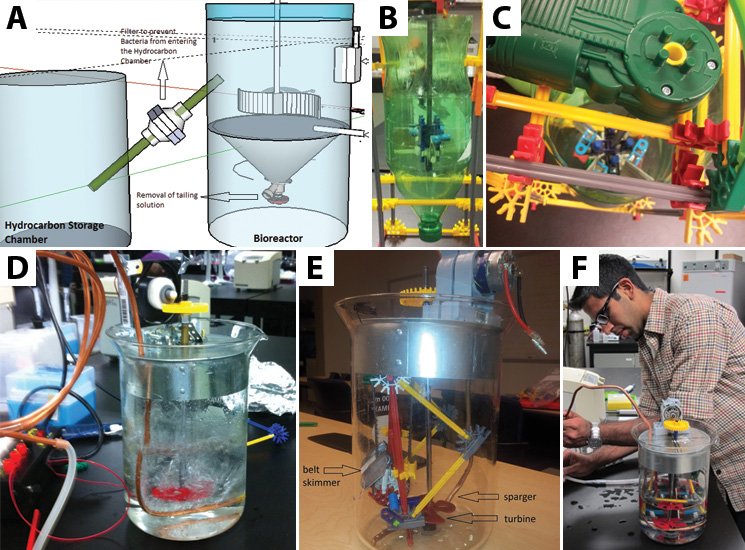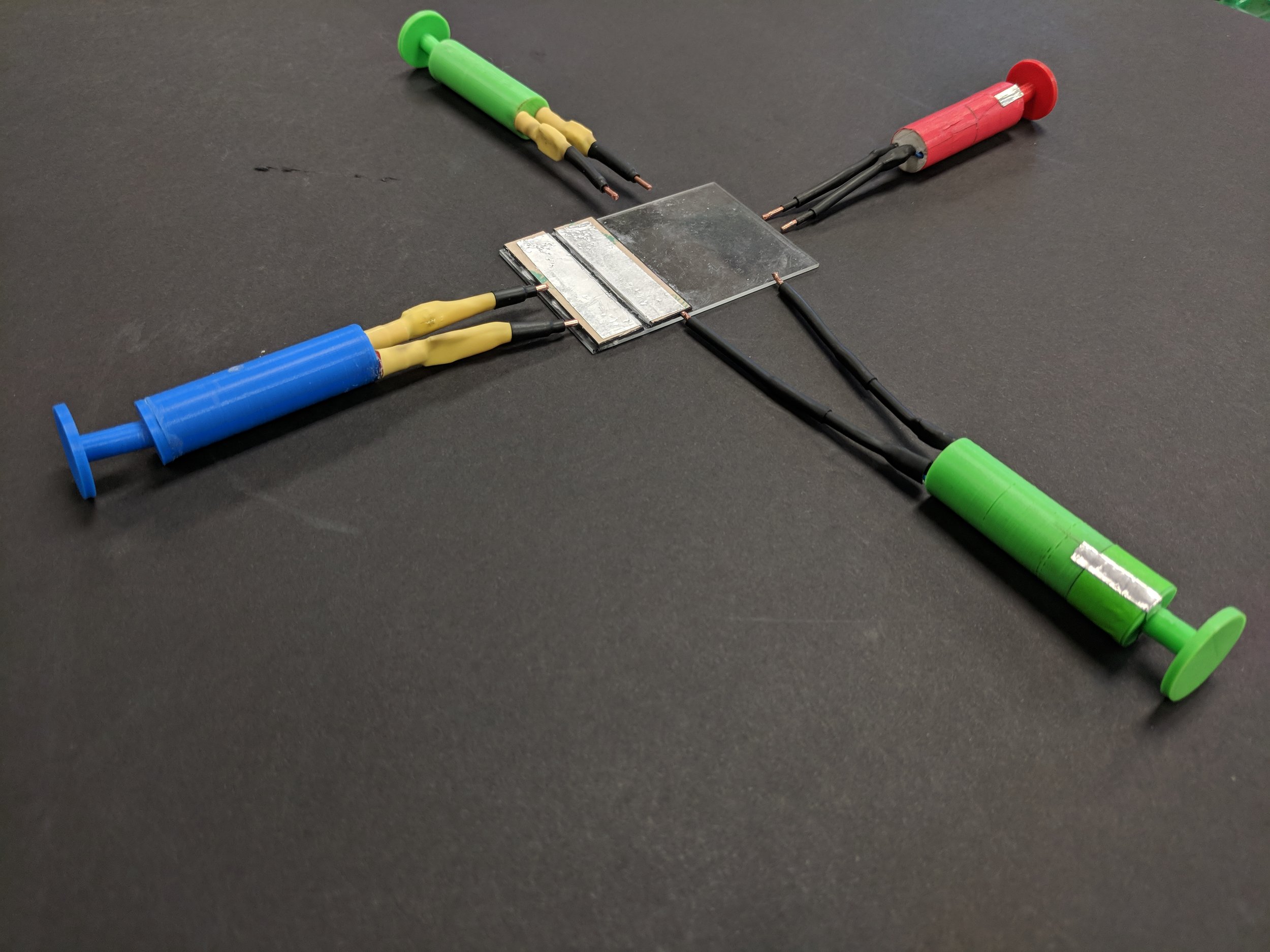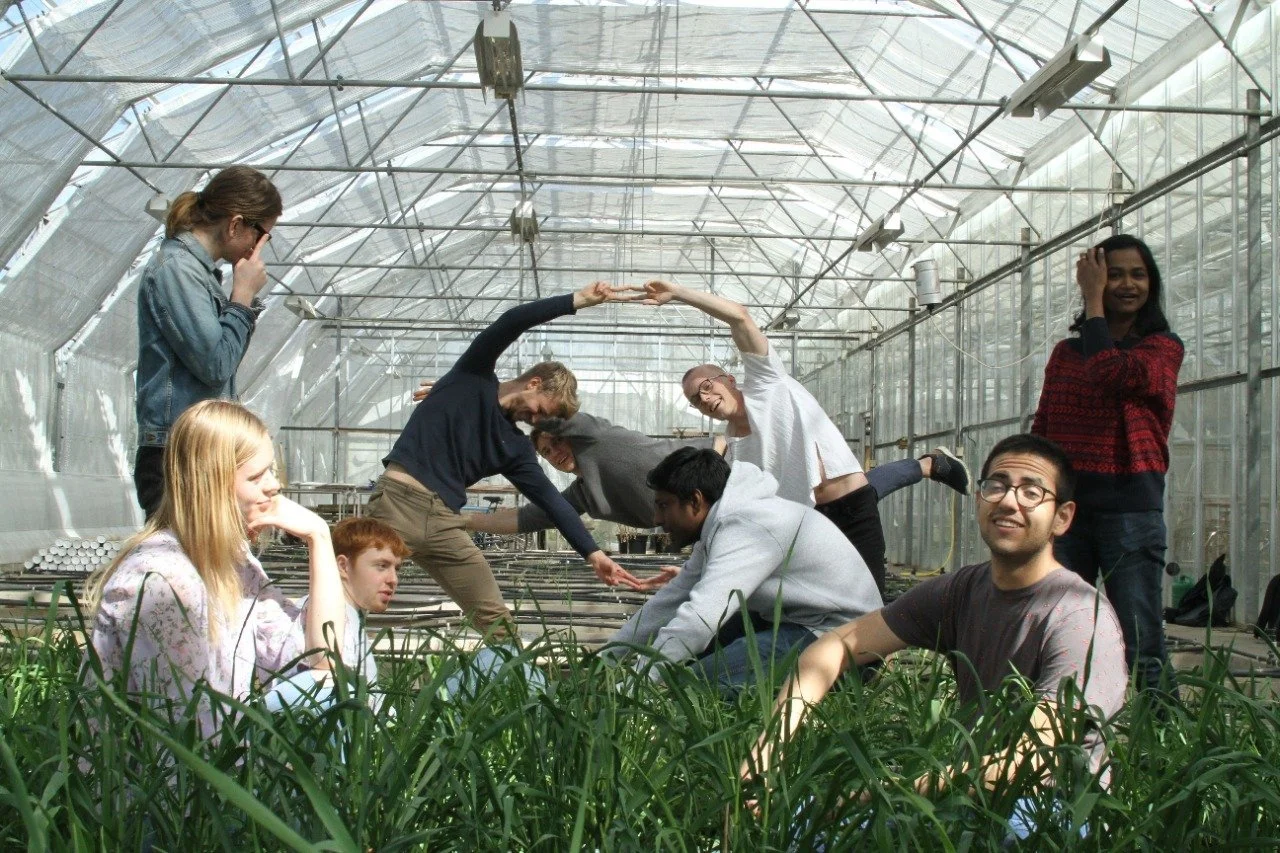Critical components: Engineering hardware for engineering biology
Hardware, Software, Wetware – all are encompassed within the Design-Build-Test-Learn cycle of synthetic biology. In honor of 20 years of iGEM, we’d like to feature the Hardware developed by iGEM teams.
Every synthetic biology experiment utilizes a variety of hardware, from liquid handling systems to centrifuges to culture machines and microscopes. There are many areas where hardware projects interfaces with synthetic biology, including:
Experiment Execution
Throughput and reproducibility are key limits to what can be accomplished in synthetic biology. Any hardware that accelerates the design, test, build, and learn cycle and/or makes experimental results more reliable and reproducible will have a significant impact on synthetic biology.
Sensors
Data acquisition for synthetic biology experiments—from optical density to fluorescence measurements—require sensors. Projects based on novel sensing technologies, or innovative remixes of current sensors, are key to pushing the boundaries of synthetic biology.
Liquid Handling
We exist in the pipette era of biology. Fluidic machines—from microfluidics to liquid handling robots—can help us realize the longstanding vision of an automated biological future.
Complexity Management
Synthetic biologists constantly manage complexity, from sample tracking to running multiple parallel experiments. Great hardware can help organize and systematize without scaling up confusion.
Accessibility
Traditional hardware for synthetic biology tends to be expensive and complicated machines, creating a barrier to entry for many would-be innovators. iGEM teams in the past have met this challenge and built hardware that is affordable, easy to make, and open.
Bioreactors
Engineered organisms typically require culturing in an in vitro environment. Great hardware can help organisms grow according to experimental parameters and execute their engineered functions.
Bio-Made Hardware
Hardware can help synthetic biologists engineer biology, but biology can also be used to engineer hardware. Projects that use genetically engineered machines to create structures, mechanisms, and other devices are an exciting part of iGEM.
For inspiration, check out some of these examples of hardware engineered by iGEM teams that have made synthetic biology easier, faster, better, and more accessible.
2009
Team Washington-Software’s BioBrick-A-Bot prototype cost 7% to build compared to the price for a commercial liquid handling robot in 2009.
Washington-Software 2009 (United States) teammates Jee Hoon Jang and 11-year old child prodigy Gabriel See introduce a new liquid handling concept “LegoRoboBrick” for automated assembly of BioBricks. Silver Medal, Undergrad Division.
2010
Cambridge 2010 (United Kingdom) designed and built a low cost electronic system for measuring light output “E.glometer” which is useful for reporter assays. Gold Medal, Finalist, iGEMers Prize.
Baltimore 2010 (United States) developed inexpensive and easily assembled lab equipment, including a gel electrophoresis apparatus and a PCR thermal cycler (later refined and made available by the Baltimore 2011 team).
2011
Calgary 2011 (Canada) created prototypes of a DIY potentiostat that can be used to measure the activity of biosensors (later refined with a step-by-step guide by the Calgary 2012 team). Gold Medal, Advance to Championship, Best Experimental Measurement Approach (Americas), Best Environment Project.
2012
Team Calgary 2012 (Canada) developed a prototype bioreactor that can operate as a completely closed system to prevent cross contamination with microbes outside the chamber.
Calgary 2012 (Canada) developed a prototype bioreactor that can operate as a completely closed system to prevent cross contamination with microbes outside the chamber. Gold Medal, Advance to Championship, Safety Commendation and Best Model (Americas West), Sweet Sixteen and Best Human Practices Advance (Championship).
2013
Dundee 2013 (United Kingdom) designed the “Moptipus” - an electronic environmental sensor that can be placed in a water body to measure: Light Levels, Temperature, Humidity, pH and dissolved oxygen level. Gold Medal, Grand Prize (Europe), iGEMer's Prize (Championship).
TUDelft 2013 (Netherlands) developed the “Zephyr” - a low-cost DIY machine that can scan petri dishes and 96 well plates for expression of fluorescence at micrometer scale. Gold Medal, Advance to Championship.
2014
iGEM piloted a Microfluidics Track
The first iteration of the OpenTrons DIY BioBot robot cost less than $2000 to build and was open source. The next version, made compatible with mass production, was demoed by Team GenSpace at iGEM in 2014.
TU_Delft-Leiden 2014 (Netherlands) demonstrated the implementation of a novel fluidic system. Gold Medal, Best Microfluidics Project, Overgrad Division.
Genspace 2014 (United States) features the second iteration of the OpenTrons DIY BioBot robot. Gold Medal, Community Lab Division.
2015
Best Hardware Project introduced as new track award within the iGEM Competition
TU_Delft 2015 (Netherlands) built a DIY biofilm printer “Biolinker” (video below) that uses engineered bacterial cells to print biofilms in a reproducible and automated way. Grand Prize, Gold Medal, Best Hardware Project, Best Applied Design, Overgrad Division.
Cambridge-JIC 2015 (United Kingdom) engineered OpenScope, an open-source, 3D printable fluorescence microscope suitable for teaching, use in developing countries, and incorporation into laboratory systems. Gold Medal, Nominated for Best Hardware Project, Best Software Tool, Best Applied Design, Undergrad Division.
2016
Special Award for Best Hardware introduced for teams not in the Hardware Track
Uppsala 2016 (Sweden) created an easy method for making microfluidic chips capable of transforming cells through heat shock. Gold Medal, Best Hardware Project, Overgrad Division.
Valencia UPV 2016 (Spain) designed a set of hardware to create a low cost system for working with CRISPR/Cas9 technology for plant genome editing. Gold Medal, Best Hardware Special Award, Best Software Tool, Undergrad Division.
LMU-TUM Munich 2016 (Germany) built an open source DIY bioprinter that can be easily assembled at a low cost below 100 USD. Gold Medal, Grand Prize, Best Hardware Special Award, Best Manufacturing Project, Best Software Tool, Overgrad Division.
Nominees for Best Hardware Special Award: Aachen 2016 (Germany) LIPs - Light Inducible Proteases; DTU-Denmark 2016 (Denmark) YEASTILIZATION - From Waste to Value; Newcastle 2016 (United Kingdom) Culture Shock: Building Biological Analogues of Electronic Devices; UMaryland 2016 (United States) Biosequestration and Subsequent Degradation of Methane to Combat Greenhouse Gas Emissions.
2017
Dedicated space within the Jamboree for teams to showcase hardware prototypes
Team BostonU HW 2017 developed an end to end system to make microfluidics become a more accessible and practical tool for synthetic biologists to integrate into their labs.
BostonU HW 2017 (United States) developed MARS (Microfluidic Applications for Research in Synbio) – an end to end system to make microfluidics become a more accessible and practical tool for synthetic biologists to integrate into their labs. Gold Medal, Best Hardware Project, Undergrad Division.
Shanghaitech 2017 (China) built a low cost, integrated hardware platform that enables designers with minimal experience in synthetic biology to build complex bio-products free of lab work. Gold Medal, Best Hardware Special Award, Undergrad Division.
CLSB-UK 2017 (United Kingdom) created a combined fluorometer and densitometer that can be used as a cheap, portable and effective screening tool in the field, in remote areas or less developed countries, and by schools, community labs, and other groups with limited resources. Gold Medal, Best Hardware Special Award, Best Integrated Human Practices, Best Software Tool, Best New Composite Part, High School Division.
Munich 2017 (Germany) built a set of portable hardware tools from 3D-printed parts and standard electronic components that can measure and record the kinetics of biological or chemical reactions on paper. 1st Runner up, Gold Medal, Best Hardware Special Award, Best Applied Design, Best Software Tool, Best Model, Best Diagnostics Project, Overgrad Division.
Nominees for Best Hardware Special Award: Aachen 2017 (Germany) Salt Vault; Bielefeld-CeBiTec 2017 (Germany) Expanding the Genetic Code; IISc-Bangalore 2017 (India) iFLOAT: a multifaceted approach to cluster bioengineered gas vesicles in vitro and enhance their flotation; SUSTech Shenzhen 2017 (China) C.elegans in Skinner Box — the study of learning behavior based on optofluidics; UMaryland 2017 (United States) An Apeeling Solution to Panama Disease In Bananas; Wageningen UR 2017 (Netherlands) Mantis: Modular antigen-based test for infectious diseases; WashU StLouis 2017 (United States) Operation: Ultraviolet.
2018
Excellence in Hardware recognized under the Best Open Project track award
Team Valencia UPV’s Printeria won the Best Hardware special award in 2018. Their system is designed to fully automate the creation of genetic circuits, and make genetic engineering technology accessible to the general public.
Madrid-OLM 2018 (Spain) created the internet of biothings, bringing together microfluidics, aptamer-based sensors, and an affordable electrochemical metrological system. Silver Medal, Nominated for Best Open Project, Undergrad Division.
Unesp Brazil 2018 (Brazil) iteratively designed, built, and tested a 3D-printed bioreactor that has the ability to simulate, as closely as possible, the conditions within the human intestine. Gold Medal, Best Hardware Special Award, Overgrad Division.
Valencia_UPV 2018 (Spain) engineered Printeria, a fully-equipped bioengineering device able to automate the process of printing genetic circuits in bacteria but made as simple and easy to operate as a domestic desktop printer. Gold Medal, Best Hardware Special Award, Best New Application Project, Best Model, Best Software Tool, Best Wiki, Undergrad Division.
Team Lambert GA’s ElectroPen is a novel 20-cent electroporator built using the underlying principles of a common household lighter that weighs only 13g, can be fabricated using everyday materials, and requires no access to electricity.
Lambert GA 2018 (United States) developed the ElectroPen, a novel 20-cent electroporator built using the underlying principles of a common household lighter that weighs only 13g, can be fabricated using everyday materials, and requires no access to electricity. Gold Medal, Best Hardware Special Award, Best Integrated Human Practices, Best Presentation, Best Measurement, High School Division.
Nominees for Best Hardware Special Award: Aachen 2018 (Germany) Melasense; BostonU_HW 2018 (United States) TERRA: An application agnostic device that selectively dispenses the outputs of microfluidic chips; ETH_Zurich 2018 (Switzerland) AROMA - Autonomous Robot for Odorant Measurement in Air; Grenoble-Alpes 2018 (France) Phagyzer: a fully automated detection device in the superbugs era; NCKU_Tainan 2018 (Taiwan) One step closer towards a low carbon society; NUS_Singapore-A 2018 (Singapore) Eco-friendly Bio-manufacturing of Flavonoid Dyes in Escherichia coli via Computer-mediated Optogenetic Regulation; TecCEM 2018 (Mexico) Novel Treatment: Tissue regeneration in burns by recombinant proteins with nanodelivering on a MiniSkin Simulator.
2019
Sheffield 2019 (United Kingdom) developed OPENLUX, an affordable learning kit for kids in high school that combines engineering, coding, and biology. Gold Medal, Best Open Project, Undergrad Division.
NCKU Tainan 2019 (Taiwan) developed CreSense, a blood p-Cresol quantification device that is also highly customizable and can become a multi-purpose quantification platform for a wide range of compounds and biomarkers. Gold Medal, Best Hardware Special Award, Best Measurement, Best Model, Best Presentation, Best Therapeutics Project, Undergrad Division.
Team Exeter’s PETexe is designed to capture plastic microfibres from laundry machines for enzymatic removal.
Exeter 2019 (United Kingdom) designed, built and tested a water filter capable of capturing microfibres, and containing enzymes so that the fibres are broken down on site within the filter without having to store large volumes of contaminated water. Gold Medal, Best Hardware Special Award, Best Environment Project, Best Integrated Human Practices, Best Model, Best Supporting Entrepreneurship, Best Wiki, Overgrad Division.
GreatBay SZ 2019 (China) engineered a low cost spinning machine so that spider silk can be properly pulled and collected. Grand Prize, Gold Medal, Best Hardware Special Award, Best New Basic Part, Best Part Collection, Best Presentation, Best Wiki, High School Division.
Nominees for Best Hardware Special Award: Bielefeld-CeBiTec 2019 (Germany) Troygenics - The Odyssey to World Transforming Shuttles; BIT 2019 (China) Achieved Transcription Management (ATM); Nanjing-China 2019 (China) A new method for the removal and reutilization of Phosphate in the sewage; SUSTech_Shenzhen 2019 (China) C-hoop; UESTC-China 2019 (China) An Expired Drug Solution.
2020
NCKU_Tainan 2020 (Taiwan) designed Eye Screen, an affordable and portable device that uses ultrasound for early detection of glaucoma. Gold Medal, Best Hardware Special Award, Undergrad Division.
SDU-Denmark 2020 (Denmark) designed and built a Prostate Malignancy Test and a Congenital Risk Assessment Test using iterative workshops, rapid pre-to-typing, and end-user communication to accommodate the needs of the end users. Gold Medal, Best Hardware Special Award, Best Wiki, Overgrad Division.
Nominees for Best Hardware Special Award: Aachen 2020 (Germany) M.A.R.S. - Magnetic ATP Recycling System; Calgary 2020 (Canada) Oviita: A Community-Based Approach to Vitamin A Deficiency; Grenoble_Alpes 2020 (France) Innovative biotreatment for P.aeruginosa biofilm infections using an engineered E.coli; TAS_Taipei 2020 (Taiwan) Viral Spiral: An Accurate, Fast and Simple Viral Diagnostic Test; Vilnius-Lithuania 2020 (Lithuania) FlavoFlow - a comprehensive exogenous fish infections detection, treatment and prevention strategy; ZJUT_China_B 2020 (China) Multivirus Monitor.
2021
UPenn 2021 (United States) engineered the OptoReader, an affordable, open-source device that couples optogenetic stimulation with real-time fluorescence and optical density measurements, allowing for 96 programmable parallel experiments. Gold Medal, Best Hardware Special Award, Best Presentation, Undergrad Division.
Aachen 2021 (Germany) constructed “DIPsy” (video below), an enzymatic de novo DNA synthesis platform for data storage. Gold Medal, Best Hardware Special Award, Overgrad Division.
SJTang 2021 (China) built a photobioreactor system to grow Rhodopseudomonas palustris and E. coli and safely collect and fill the gas products into standard containers. Silver Medal, Best Hardware Special Award, High School Division.
Nominees for Best Hardware Special Award: Concordia-Montreal 2021 (Canada) Astroyeast Microfarm: Space-adapted nutrient and flavour factory; Ecuador 2021 (Ecuador) AgroBactory 593: a bacterial platform for producing specific biopesticides; Lambert_GA 2021 (United States) AgroSENSE; LINKS_China 2021 (China) NeoLeathic Age Revolutionary Leather Substitute from Kombucha, Spider-silk, and Natural Dyes; NCKU_Tainan 2021 (Taiwan) MenTAUR - Your Life’s Mentor; NUS_Singapore 2021 (Singapore) Photo-Regulated Yeast for Synthetic Biology Manufacturing (PRYSM); Paris_Bettencourt 2021 (France) Mini.ink: think big, go with minicells; Rochester 2021 (United States) Bio-Spire: A novel diagnostic device for the continuous monitoring of biomarkers in sweat; ShanghaiTech_China 2021 (China) Mussel Inspired Biocompatible Osteogenic Material(MIBOM); SHSBNU_China 2021 (China) Commercially Adoptable Reusing Option for Luxurious IoNs in Effluents; TAS_Taipei 2021 (Taiwan) UniversO: Enzymatic Blood Type Conversion to Eliminate Transfusion Incompatibility; UNILausanne 2021 (Switzerland) Aprifreeze - biological treatments to protect apricot trees from frost damage; Vilnius-Lithuania 2021 (Lithuania) AmeBye: prevention and detection tools for eradication of infectious disease amebiasis; ZJU-China 2021 (China) Liver Guard: Precise therapy of hepatocellular carcinoma based on engineered oncolytic adenovirus.
2022
Team PuiChing_Macau 2022 (Macau) iteratively designed, built, and tested a hydroponic system to enhance plant growth.
INSA_Lyon1 2022 (France) constructed the FIAT LUX box, a simple and customizable chamber that enables users to measure inner temperature and humidity and detect bioluminescence. 1st Runner-Up, Gold Medal, Best Hardware Special Award, Best Food & Nutrition Project, Best New Composite Part, Undergrad Division.
UFMG_UFV_Brazil 2022 (Brazil) created a low-cost modular open-source bioreactor, capable of working as Batch, Fed-Batch, PhotoBioReactor and more. Gold Medal, Best Hardware Special Award, Overgrad Division.
PuiChing_Macau 2022 (Macau) iteratively designed, built, and tested a hydroponic system to enhance plant growth. 1st Runner-Up, Top 10, Gold Medal, Best Hardware Special Award, Best Sustainable Development Impact, High School Division.
Nominees for Best Hardware Special Award: Aachen 2022 (Germany) MEtaPhos - Modified Enzymes targeting Phosphate-recycling; Ionis_Paris 2022 (France) StarchLight: generating and storing energy in a bacterial fuel cell powered by brewers spent grain; Lambert_GA 2022 (United States) CADlock: Early Screening for Coronary Artery Disease by Detecting MicroRNAs Through the Rolling Circle Approach; Rochester 2022 (United States) Saptasense: Saving Syrup; Sheffield 2022 (United Kingdom) rEvolver Vivo La Evolution; Sogang_Korea 2022 (Korea) SynBioBot - A Robotic Arm System for Cell Culture and Viral Transduction with Remote Control; THINKER_CHINA 2022 (China) LysTech DETR, a pioneering chromogenic detection system; TUDelft 2022 (Netherlands) SPYKE: Detect to Protect; Wego_Taipei 2022 (Taiwan) Eutro in Vitro: Synthetic Biological Reduction of Phosphate Concentration to Resolve Eutrophication; ZJU-China 2022 (China) Story Light: restoration of stone relics by Microbial Induced Calcite Precipitation.
The ingenuity demonstrated by these teams in designing, building and testing hardware for their projects is truly impressive, and their work has helped ensure the success of future teams and the greater synthetic biology research community. We’re excited to see the innovations in hardware that the 2023 teams will bring to the Grand Jamboree!















